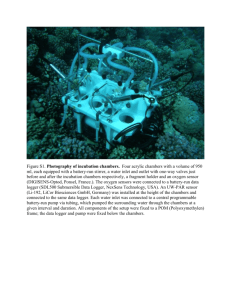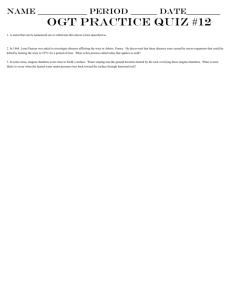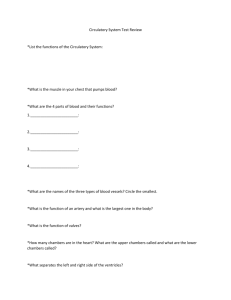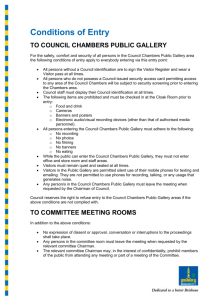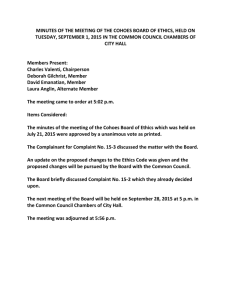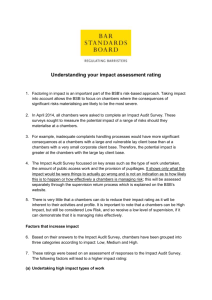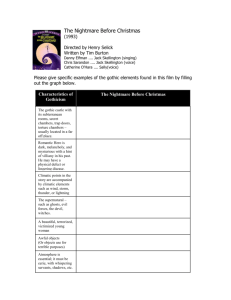Anthony Nardini - Rowan University
advertisement
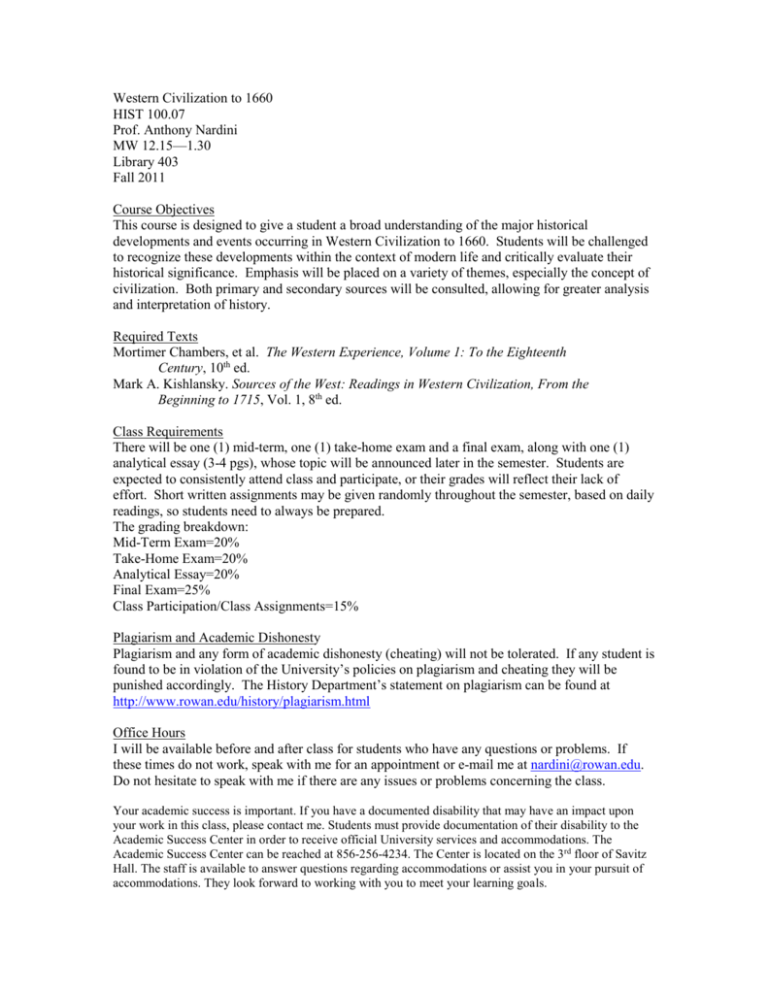
Western Civilization to 1660 HIST 100.07 Prof. Anthony Nardini MW 12.15—1.30 Library 403 Fall 2011 Course Objectives This course is designed to give a student a broad understanding of the major historical developments and events occurring in Western Civilization to 1660. Students will be challenged to recognize these developments within the context of modern life and critically evaluate their historical significance. Emphasis will be placed on a variety of themes, especially the concept of civilization. Both primary and secondary sources will be consulted, allowing for greater analysis and interpretation of history. Required Texts Mortimer Chambers, et al. The Western Experience, Volume 1: To the Eighteenth Century, 10th ed. Mark A. Kishlansky. Sources of the West: Readings in Western Civilization, From the Beginning to 1715, Vol. 1, 8th ed. Class Requirements There will be one (1) mid-term, one (1) take-home exam and a final exam, along with one (1) analytical essay (3-4 pgs), whose topic will be announced later in the semester. Students are expected to consistently attend class and participate, or their grades will reflect their lack of effort. Short written assignments may be given randomly throughout the semester, based on daily readings, so students need to always be prepared. The grading breakdown: Mid-Term Exam=20% Take-Home Exam=20% Analytical Essay=20% Final Exam=25% Class Participation/Class Assignments=15% Plagiarism and Academic Dishonesty Plagiarism and any form of academic dishonesty (cheating) will not be tolerated. If any student is found to be in violation of the University’s policies on plagiarism and cheating they will be punished accordingly. The History Department’s statement on plagiarism can be found at http://www.rowan.edu/history/plagiarism.html Office Hours I will be available before and after class for students who have any questions or problems. If these times do not work, speak with me for an appointment or e-mail me at nardini@rowan.edu. Do not hesitate to speak with me if there are any issues or problems concerning the class. Your academic success is important. If you have a documented disability that may have an impact upon your work in this class, please contact me. Students must provide documentation of their disability to the Academic Success Center in order to receive official University services and accommodations. The Academic Success Center can be reached at 856-256-4234. The Center is located on the 3rd floor of Savitz Hall. The staff is available to answer questions regarding accommodations or assist you in your pursuit of accommodations. They look forward to working with you to meet your learning goals. Course Schedule 7 Sept. Introduction and Overview of Class 12 Sept. The Discipline of History; Themes in Western Civilization Lord Acton. “Inaugural Lecture on the Study of History, 1906,” found at http://www.fordham.edu/halsall/mod/1906acton.html “How to Read a Primary Source,” found at http://www.bowdoin.edu/writingguides/primaries.htm Chambers. xxiii-xxv 14 Sept. Mesopotamia, Egypt, and the Near East Chambers, 3-30 19 Sept. Early Greek Civilization: Crete and Mycenae; the Polis and War Chambers, 33-57; Kishlansky, Thucydides (History of the Peloponnesian War) 21 Sept. Classical Greece Chambers, 63-76; Kishlansky, Plato (Apology and The Republic) 26 Sept. Alexander’s Empire and the Hellenistic World Chambers, 76-86; Kishlansky, Aristotle (Politics) 28 Sept. Early Rome and the Republic Chambers, 89-110; excerpts from Livy, History of Rome, found at http://www.fordham.edu/halsall/ancient/livy-rape.html 3 Oct. Rome and Empire Chambers, 111-32; Kishlansky, Suetonius (The Life of Augustus) 5 Oct. Decline of the Roman Empire; Christianity Chambers, 132-51; Kishlansky, St. Paul (Epistle to the Romans), St. Augustine of Hippo (City of God) 10 Oct. Change and Stability in the ‘Dark Ages’ Chambers, 155-75; Kishlansky, Tacitus (Germania), Justinian, (Code) 12 Oct. Kingdoms of the Early Middle Ages: Muslims, Franks, and ‘Raiders’ Chambers, 181-207: Kishlansky, The Koran 17 Oct. MID-TERM EXAM 19 Oct. High Middle Ages I: Feudalism Chambers, 211-32; Kishlansky, “Feudal Documents” 24 Oct. High Middle Ages II: Expansion and the Crusades Chambers, 232-239 26 Oct. Medieval Society: Culture, Government, and the Church Chambers, 243-69; Kishlansky, Thomas Aquinas (Summa Theologica), Magna Carta 31 Oct. The Development of Commerce and Government Chambers, 273-94; Kishlansky, Dante (The Divine Comedy) 2 Nov. Late Middle Ages: Breakdown Chambers, 297-324; excerpt from Boccaccio, The Decameron, found at http://www.fordham.edu/halsall/source/decameronintro.asp 7 Nov. The Renaissance I Chambers, 327-40; Kishlansky, Petrarch (Letters), Leon Battista Alberti (On the Family) 9 Nov. The Renaissance II Chambers, 341-53; excerpt from Pico della Mirandola, “Oration on the Dignity of Man,” found at http://www.thecaveonline.com/APEH/renaissancedocument.html 14 Nov. Crisis and Reformation I Chambers, 355-70; Kishlansky, Erasmus (In Praise of Folly), Martin Luther (The Freedom of a Christian and Of Marriage and Celibacy) 16 Nov. Crisis and Reformation II Chambers, 370-82; Kishlansky, Ignatius Loyola (Spiritual Exercises) 21 Nov. Commercial Expansion and Political Power Chambers, 385-415; Kishlansky, Niccolò Machiavelli (The Prince) 23 Nov. NO CLASS---WORK ON TAKE-HOME EXAM, ANALYTICAL ESSAY 24-25 Nov. NO CLASS—Thanksgiving Break 28 Nov. International Rivalries, Internal Crises, and War I Chambers, 419-31; Kishlansky, Henri IV (Edict of Nantes) Take-home Exam Due 30 Nov. International Rivalries, Internal Crises, and War II Chambers, 431-45; Hans von Grimmelshausen (Simplicissimus) 5 Dec. Culture and Science in the 16th-17th Centuries I Chambers, 449-69 7 Dec. Culture and Science in the 16th-17th Centuries II Chambers, 469-76 12 Dec. The Western Legacy: The Emerging “Modern” World Supplementary Readings TBA Final Analysis and Reassessment 14-16, 19-20 Dec. Final Exams Week
